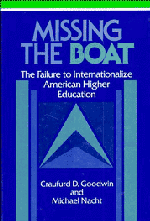Book contents
- Frontmatter
- Contents
- Introduction
- 1 Higher education looks abroad: historical trends
- 2 Who goes today? and who does not?
- 3 Individual costs and benefits
- 4 Campus attitudes
- 5 Obstacles to international experience
- 6 Issues for debate
- 7 Cases studies
- 8 Epilogue: missing the boat
- Appendix: institutions visited
- Index
Introduction
Published online by Cambridge University Press: 04 August 2010
- Frontmatter
- Contents
- Introduction
- 1 Higher education looks abroad: historical trends
- 2 Who goes today? and who does not?
- 3 Individual costs and benefits
- 4 Campus attitudes
- 5 Obstacles to international experience
- 6 Issues for debate
- 7 Cases studies
- 8 Epilogue: missing the boat
- Appendix: institutions visited
- Index
Summary
For many faculty the desire and the need to go abroad are inherent in the nature of their discipline, and for centuries scholars have traveled far and wide for academic purposes. For other faculty the thought of going abroad for scholarly purposes is completely alien. For many, however, the possibility of time abroad is simply not feasible, for a variety of personal considerations and a multitude of other reasons. To ask faculty whether they would go abroad for academic purposes generates many responses, often conflicting, that reveal the complexity of the role of international experience in their professional careers.
The Council for International Exchange of Scholars (CIES) has played a unique role in the more than forty years that it has worked with the Fulbright Scholar Program. We have sought to attract faculty for Fulbright research grants and lectureships, originally in a handful of countries; today we send approximately one thousand U.S. faculty abroad annually to more than 120 countries. Unlike most other programs supporting scholarly activity abroad, a high percentage of Fulbright grants for faculty are for overseas lecturing opportunities, and CIES has been keenly aware of the obstacles scholars face in going abroad in this capacity. However, all other distinguished fellowship programs for overseas research, as well as U.S. Agency for International Development (AID) funded technical assistance initiatives and campus-based programs that offer opportunities for faculty, have had difficulties attracting applicants at one time or another.
- Type
- Chapter
- Information
- Missing the BoatThe Failure to Internationalize American Higher Education, pp. vii - xivPublisher: Cambridge University PressPrint publication year: 1991



